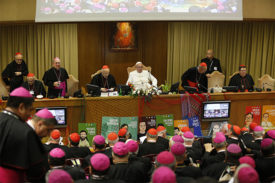Post-synod document merely hints at that possibility in the future

by Christopher White, National Correspondent
NEW YORK — Pope Francis’ highly anticipated document on the Amazon, released on Feb. 12, bypasses two hot-button issues looming over its publication — married priests and women deacons.
Meanwhile, it calls for “outrage” over the treatment of the region’s land and its peoples.
“Querida Amazonia” (“Beloved Amazon”), the post-synodal apostolic exhortation, marks the pope’s final reflections on October’s Synod of Bishops for the Pan-Amazon region.
The document is meant to serve as a response to the synod’s final document, “The Amazon: New Paths for the Church and for Integral Ecology.”
In “Beloved Amazon,” Pope Francis seems to leave open the possibility that in the future married men who have had a “fruitful permanent diaconate” could be ordained as priests in the region, as the final synod document outlined.
But Pope Francis didn’t address the issue head-on, only lamenting that “every effort should be made” to ensure people in the region, some of whom see a priest only once or twice a year, have regular access to the sacraments, especially the Eucharist and confession.
The pope did discuss the issue on Feb. 10 with some U.S. bishops who were in Rome. According to Bishop Oscar Solis of Salt Lake City, the pope said that he “didn’t actually believe in the ordination of married men, but what are you going to do with all those people who are deprived of the Eucharist.”
Bishop Solis told Catholic News Service the pontiff had given the bishops the impression that the issues of ordaining married men and women deacons for ministry in far-flung communities would be a matter for future discussion and discernment.
While highlighting the importance of priests in the document, the pope also issued a strong call for leadership that is “distinctively lay.”
“A Church of Amazonian features requires the stable presence of mature and lay leaders endowed with authority and familiar with the languages, cultures, spiritual experience and communal way of life in the different places, but also open to the multiplicity of gifts that the Holy Spirit bestows on every one,” he wrote.
“The challenges in the Amazon region demand of the Church a special effort to be present at every level, and this can only be possible through the vigorous, broad and active involvement of the laity,” he wrote.
In a footnote, Pope Francis quoted the Code of Canon Law, which says it is possible that due to a shortage of priests, a bishop can entrust “participation in the exercise of the pastoral care of a parish … to a deacon, to another person who is not a priest, or to a community of persons.”
As for the role of women, Pope Francis said that in some communities in the Amazon, women have been responsible for preserving the faith, “even though no priest has come their way, even for decades.”
“This summons us to broaden our vision, lest we restrict our understanding of the Church to her functional structures,” Pope Francis said, going on to warn that the church cannot run the risk of “clericalizing women” by simply granting them Holy Orders.
Women, he wrote, have a “central part to play in Amazonian communities, including … access to positions, including ecclesial services, that do not entail Holy Orders and that can better signify the role that is theirs.”
“Here it should be noted that these services entail stability, public recognition and a commission from the bishop. This would also allow women to have a real and effective impact on the organization, the most important decisions and the direction of communities, while continuing to do so in a way that reflects their womanhood,” he added.
During the synod and in the lead-up to the exhortation, both Pope Francis and organizers of the synod voiced frustration that the debates over married priests and women deacons had dominated the bulk of the discussion outside of the synod — possibly motivating the pope’s decision not to weigh in on those issues directly and front-load the document with a mix of firsthand testimonials and accounts of the region’s needs and the aspirations of its peoples.
The region, he wrote, is facing an “ecological disaster,” but the response to it cannot separate the land from its people. “A true ecological approach always becomes a social approach; it must integrate questions of justice in debates on the environment, so as to hear both the cry of the earth and the cry of the poor,” he wrote.
Pope Francis offered sweeping condemnations of the treatment of indigenous peoples, the imbalance of power that has left “the weak with no means of defending themselves,” the massive deforestation of the land, the long history of colonization and corruption, including the sins of the church.
“We need to feel outrage as Moses did, as Jesus did, as God does in the face of injustice,” he wrote.
“The incidents of injustice and cruelty that took place in the Amazon region even in the last century ought to provoke profound abhorrence, but they should also make us more sensitive to the need to acknowledge current forms of human exploitation, abuse and killing.”
Editor’s Note: The Apostolic Exhortation was released just before The Tablet went to press. For updates, go to thetablet.org
